- Home
- Stephanie Laurens
The Masterful Mr. Montague Page 11
The Masterful Mr. Montague Read online
Page 11
Adair had briefly explained his wife’s interest in the case, and that Stokes was aware of her involvement. Having been exposed to ladies of Penelope Adair’s ilk through his association with various noble families, Montague took her presence—and her interest—in his stride. He wasn’t foolish enough to underestimate her abilities, and he could easily imagine several ways in which her insights might prove valuable. Consequently, he’d felt no reservations over sharing everything he’d thus far learned about Lady Halstead’s accounts, investments, and estate with Penelope as well as Adair.
Although he’d spent hours combing through the copies of Lady Halstead’s financial records, he had yet to find any hint of a legitimate source for the odd payments. However, as he’d told the others, Sir Hugo Halstead had had his finger in a great many pies, and tracking, accounting for, and excluding every last possible avenue that might explain the odd payments was going to take considerable time.
The payments didn’t follow any recognizable pattern, but that didn’t mean some peculiar investment hadn’t been structured to pay out in such a fashion. Until they excluded such a source—and that could only be done by exhaustive searching and analysis—that the payments were legitimate had to remain a possibility.
Against that, as Penelope had noted, stood the fact that her ladyship had been murdered all but coincident with her announcement that she was looking into her financial affairs.
Or rather, having them looked into.
They’d concluded that consulting with Runcorn as to whether he had a complete listing of the Halsteads’ investments, past as well as present, would be a helpful next step. Adair and Penelope had also been keen to meet the young man-of-business, in their eyes another player in the drama.
Crossing Winchester Street, they reached the door of Runcorn and Son. Opening the door, Montague stood back while Penelope and Adair entered, then Montague followed.
Only to walk into consternation.
An ashen-looking Pringle came hurrying up, waving his hands. “No, no—I’m sorry, ma’am, but the office is closed.”
Penelope blinked, then looked past the slight man at the two constables hovering about an inner door. “Why?”
Her question threw Pringle into an even greater fluster. “Ah . . .” Wringing his hands, he looked past Penelope to Adair, then further . . . and recognized Montague. “Oh, sir! Such a thing! It’s Mr. Runcorn, sir—he’s dead.”
“Dead?” All three of them echoed the word.
Adair threw Montague a glance.
“How?” Montague asked, moving forward to face Pringle.
“I’m . . . not sure.” Pringle looked unsteady on his feet. “If I had to guess, I’d say he was knocked on the head and strangled. Oh, my!”
“Here.” Penelope took Pringle’s arm and gently steered him to a chair—the one behind his raised desk, as it happened. “Sit and compose yourself.” She glanced around the small office. “Is there somewhere I could make you some tea?”
Pringle babbled his gratitude and pointed out the small door that led to a cramped service area. Penelope patted his arm and headed that way.
Montague studied Pringle’s face; if anything, the man had paled even more. He gentled his voice. “When did it happen, do you know?”
Pringle gulped. “I left him here as I usually do, about seven o’clock last night. He was still searching through Lady Halstead’s file—he had all the documents spread out on his desk.” Pringle looked toward the inner office. “They’re still there. I saw them when I went in this morning . . . and found him.” His voice broke. “Lying on the floor behind his desk . . . dead.” Pringle looked at Montague. “I knew he was dead right away.”
“Why did you go into the office?” Barnaby quietly asked. “Did something alert you?”
“No, no.” Pringle shook his head. “I went in to return the originals of the documents I’d copied for Mr. Montague. I finished the copies late yesterday afternoon and hadn’t yet returned the originals to the Halstead box. Mr. Runcorn had the box with him and was up to his eyeballs, so to speak, so rather than disturb him, I left the documents I had in my desk. If he’d wanted them, he knew I had them and where they would be. So this morning I thought he’d be finished with the box, and I went in with the documents to put them away . . .” He swallowed. “And that’s when I found him.”
“How very distressing.” Penelope arrived with a mug of strong tea. “Here—drink this, and try not to think about anything for a while.”
“Thank you, ma’am.” Pringle accepted the cup, wrapping his thin hands around it. “You’re very kind.”
Barnaby waited for Pringle to take a sip of the tea—highly sugared, he had not a doubt; Penelope knew what was needed—then he asked, still speaking in a gentle tone, “After you found Mr. Runcorn, what did you do?”
Pringle sighed. “Didn’t know what to do, did I? I panicked, dropped the documents on his desk, and rushed out into the street—and there were the two constables on their beat. I dragged them in and showed them.” Without glancing at the inner office, he nodded that way. “They’ve been in there ever since. I think they’ve sent for help from their station.” He sipped, then glanced at the clock. “It hasn’t been that long. I didn’t go into the office until after nine.” He looked down. “I just thought he was in there working.”
Barnaby glanced at Montague, then walked toward the inner office. The door was fully open, but before he reached the doorway, a burly constable hove into view.
“I’m sorry, sir, but you can’t come in here. Murder most foul. We’re waiting for the doctor and our sergeant—can’t let anything be touched until they say.”
“Indeed. I do hope you’ve touched as little as possible.” Barnaby drew out a card case and flicked it open. “I’m a consultant to the Metropolitan Police and am presently working on a case with Inspector Stokes of Scotland Yard. The case concerns a client of Mr. Runcorn. She, too, was recently murdered. It’s therefore highly likely that Runcorn’s murder is linked to Stokes’s case. That connection is why we”—with a wave, he indicated Penelope and Montague—“arrived to consult Mr. Runcorn.” Handing the constable one of Stokes’s cards, Barnaby added one of his own for good measure; there were times when being an “Honorable” could be helpful. “I strongly suggest you send someone to summon Stokes immediately. He’s presently at the Yard in a meeting.” Imagining Stokes’s response, Barnaby hid a wry smile. “I can assure you he’ll want to be disturbed.”
The constable frowned at the cards, then looked up at Barnaby and nodded. “Right. Thank you, sir. I’ll send my partner right away.”
Barnaby inclined his head and drifted back to rejoin the others. “Let’s give them a few minutes to get themselves organized.”
A few minutes was all it took; the burly constable sent his young, gangly partner off with orders to take a hackney to Scotland Yard and report to Inspector Stokes with all speed.
When the door shut behind the younger man, Barnaby arched his brows at Penelope and Montague, then ambled back, the other two following, to the inner office.
The burly constable saw them coming and straightened. “Sir?”
Knowing that the police surgeon for the district, harassed individuals though they always were, was likely to arrive before Stokes, Barnaby thought it wise to push a little. “I wondered, Constable, if I might take a brief look. Our own investigations are pressing, and as what happened here was almost certainly an outcome of the earlier murder, if I could view the body, and even more the desk and the papers on it, we might be able to move matters forward at a better pace.”
From his expression, it was obvious the constable wasn’t sure he should agree but equally wasn’t sure of the wisdom of refusing.
In an understanding tone, Barnaby promised, “I won’t touch anything.”
The constable glanced past him at Penelope and Montague. “Just you?”
Penelope smiled reassuringly at the man. “We’ll wait in the doorway and just watch.�
�
The constable considered, then glanced at Barnaby. “All right, then. Just as long as you don’t move anything. Worth me job, that would be.”
Barnaby inclined his head and, sliding his hands into his greatcoat pockets, moved into the room. The constable watched from his station to one side of the open door. Penelope edged into the room, taking up position on the other side of the doorway while Montague hovered on the threshold.
While Adair slowly paced around the desk, Montague scanned the room, identifying what had changed since his previous visit.
Adair noticed. “Anything different?”
“Aside from poor Runcorn being sprawled on the floor”—Montague could see an out-flung hand, the arm, and not much more; it appeared Runcorn had been pulled backward out of his chair—“there’s a bookend missing off that shelf.” He pointed to a shelf behind the desk, midway up the wall; the empty space was obvious once pointed out. “I think it was a horse’s head. And”—he surveyed the documents scattered over the desk; other than the stack that Pringle must have left, obviously dropped on one corner, the entire surface of the desk was awash in a ruffled tide of paper—“that mess isn’t normal. Last time I was here, he had documents on the desk, but most were in stacks. That looks like someone searched through all the stacks, one after the other, without setting the documents back as they went. Runcorn would never have done that.”
“Hmm.” Adair had halted on the other side of the desk, looking down at the body lying stretched upon the floor. “Constable . . . I’m sorry, what was your name?”
“Watkins, sir.”
“Constable Watkins, did you or your colleague move the body at all?”
“No, sir. Just checked his pulse at his wrist and neck—which, of course, there wasn’t any.”
“Good.” Adair glanced at Penelope. “Check with Pringle, will you?”
With a nod, Penelope went, slipping past Montague.
She returned less than a minute later. “He said he didn’t touch the body at all.”
Looking down, Adair grimaced. “Understandable.” Hitching up his trousers, he crouched, then bent lower until all Montague could see were the blond curls on the back of his head. “Very well. I can see the bookend—it’s lying off to one side. We won’t know for certain until the doctor examines him, but I’d wager he was hit on the back of the head with the bookend—it looks more than heavy enough—and then . . .” His voice hardened. “The murderer, whoever he was, and I think we can be sure it was a he, looped a length of cord of some sort . . .”
Adair’s head and shoulders swiveled as he looked about, searching the floor. “And there it is. Rather sloppy of our murderer to leave it, but what looks like a length of silky curtain cord—the sort used to loop back curtains—is lying half under the desk.”
Rising, his hands still sunk in his pockets, Adair bent over the desk, head tilting this way and that as he scanned the documents rumpled and shuffled and flung in disarray upon it. “As far as I can make out, all of these relate to the Halstead estate. There’s nothing obvious, like a piece torn away, or a blot where something may have been copied.” Bending, he peered at the underside of the rocking blotter. “And nothing that looks recent on the blotter.”
“The most likely outcome”—Montague waved—“of all this would be something taken—a letter, an account, a statement—a record of some sort removed.”
Straightening, Adair grimaced. “Which will be very hard to identify.”
Montague nodded. He glanced at Watkins, then looked back at Adair. “When the police are satisfied here, my staff might be able to pinpoint some gap in the records, perhaps with Pringle’s help. We can at least look.”
Adair nodded; his gaze had returned to the body. “I think the blow to his head was powerful enough to render him unconscious. I can’t see any evidence that he struggled, that he fought.”
The weight of the silence that followed suggested that none of them found any great solace in that fact.
Adair was on his way back to the door, and the others were moving back into the outer office, when a dark-suited individual carrying a black bag came through the street door. A sharp, shrewd gaze from very weary eyes found Watkins. “Constable?”
Watkins waved the doctor to the inner office. “He’s in here, and no, no one’s touched him.”
The doctor briefly nodded to Adair, Penelope, and Montague, then strode past and into the inner office.
Montague returned to stand by Pringle at his desk. “The Halstead file—did you notice the documents on Mr. Runcorn’s desk?”
Pringle, whose color had improved, nodded. “Aye—looked like the lot had been thoroughly searched.”
“Any chance of you being able to tell if anything’s been taken?” Montague asked as Adair and Penelope joined them.
Pringle’s brows rose as he considered. “Well, I had the most important records with me, in my drawer, so we know he didn’t get any of them.”
“You’re sure they weren’t searched?” Barnaby asked.
“Aye. I’d left them in a nice neat stack in my drawer there”—Pringle looked down at the second drawer on the right side of his desk—“and set my ink-bottle and capped nibs on the top of them, as I usually do. When I opened the drawer this morning to get the stack out, the ink-bottle and nibs were exactly as I’d left them.”
“Good,” Barnaby said. “So we know those records, at least, are intact. What about the rest of the Halstead documents, the ones Runcorn was looking through?”
“As to that,” Pringle said, his thin chest swelling a trifle, “we have our own system of numbering.” He glanced toward the inner office. “If the police let me at them, I can re-sort the file, check by the numbers if any pages are missing. If any are, there’s a master list of numbers—it was in the file with all the rest in Mr. Runcorn’s office, but unless he knew what the numbers and our notations meant, I can’t see any reason any murderer would have taken the list.” Pringle’s voice had grown stronger. He straightened, meeting Barnaby’s gaze. “I can at least do that if it will help catch whoever did for Mr. Runcorn. Young he might have been, but he was a good man.”
Barnaby nodded. “I’ll do what I can to make sure you get a chance to check the documents.”
On the words, the door swung open and Stokes strode in. He came straight to them. “What’s happened?”
Barnaby told him what they knew, and what they’d deduced, in a rapid-fire report.
Stokes took it all in without a word, his face giving nothing away. When Penelope introduced Pringle and explained his role, Stokes inclined his head, his gray gaze absorbing every little detail about Runcorn’s clerk.
“So,” Barnaby concluded, “other than having the police surgeon verify our deductions about how Runcorn was killed, the two most important clues we have are that length of silk cord and the documents.” He nodded to Pringle. “Pringle here will re-sort and tell us if anything’s been taken.”
Stokes nodded. “Good. Let me handle it.” Stepping past them, he walked with a powerful, prowling stride to the inner office.
The deep growl of Stokes’s voice reached them, but Barnaby couldn’t hear exactly what was said. In less than five minutes, however, Stokes walked out of the office, a foot-high pile of papers filling his arms, an envelope balanced atop them.
Stokes handed the documents to Pringle. “That’s everything that was on Runcorn’s desk. Scotland Yard have officially seized them as part of the investigation, and I’m now handing them to you to sort for us. Just so we’re clear, the papers are for the moment the property of the police, and not to be handed to anyone without my express authority.”
“Indeed, sir.” Pringle accepted the documents.
Stokes lifted the envelope from the top of the stack, held it up to Barnaby, then slid the envelope into his pocket. “The cord. Interesting find.”
“We can only hope it’ll prove useful,” Barnaby said.
Settling the roughly stacked documents on hi
s desk, Pringle turned to Montague. “Sir—I’m not sure what to do.” He waved at the office. “There was no other partner, just Mr. Runcorn, and while I can manage the documents well enough, I can’t handle the clients, and some will surely turn up soon.”
Montague thought, then nodded. “Indeed.” Reaching into his pocket, he pulled out a card. “I suggest you place a note in the window, stating that the office is closed and will remain so for the foreseeable future, but that clients of Mr. Runcorn can seek information at this address.” He handed Pringle his card. “Then take the Halstead papers, and . . .” Drawing a sheet of fresh paper from the pigeonhole along the top of Pringle’s desk, he drew out a pencil and wrote rapidly. “Take this letter to my office and give it to Mr. Slocum, my head clerk. He’ll find a desk for you. Your first task must be to re-sort the Halstead file and determine if any pages have been taken, and if so, which. If any of Mr. Runcorn’s clients appear, my junior assistant, a Mr. Phillip Foster, will assist you in dealing with them.” Reaching the end of his missive, Montague signed the letter, then tucked away his pencil, folded the sheet, and handed it to Pringle. “That will take care of business, as it were, for the moment. We can work out what’s to be done once this matter of murder is behind us.”
Pringle met his gaze, then bowed. “Thank you, sir.” Tucking away the letter, he looked at the mammoth task represented by the pile of papers on his desk. “I’ll get on to this straightaway.”
“Before you do,” Stokes said, “I need to ask you a few questions.”
Pringle nodded; straightening, he waited.
Stokes glanced at the others. “I’ve already sent constables to canvass the neighborhood, asking if anyone noticed anything.” Returning his gaze to Pringle, he said, “So first, I want you to think back to when you last saw Mr. Runcorn alive.” When Pringle nodded, Stokes asked, “When was that?”
“Yesterday evening, about seven o’clock. I went into his office to let him know I was leaving. He was still working through the Halstead file.”

 Lady Osbaldestone’s Plum Puddings: Lady Osbaldestone’s Christmas Chronicles Volume 3
Lady Osbaldestone’s Plum Puddings: Lady Osbaldestone’s Christmas Chronicles Volume 3 The Beguilement of Lady Eustacia Cavanagh: The Cavanaughs Volume 3
The Beguilement of Lady Eustacia Cavanagh: The Cavanaughs Volume 3 Loving Rose: The Redemption of Malcolm Sinclair (Casebook of Barnaby Adair)
Loving Rose: The Redemption of Malcolm Sinclair (Casebook of Barnaby Adair) By Winter's Light
By Winter's Light Devil's Bride
Devil's Bride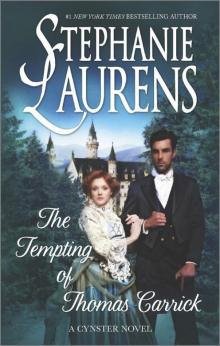 The Tempting of Thomas Carrick
The Tempting of Thomas Carrick![Cynster [22.00] A Match for Marcus Cynster Read online](http://i1.bookreadfree.com/i/03/16/cynster_[22_00]_a_match_for_marcus_cynster_preview.jpg) Cynster [22.00] A Match for Marcus Cynster
Cynster [22.00] A Match for Marcus Cynster All About Love c-6
All About Love c-6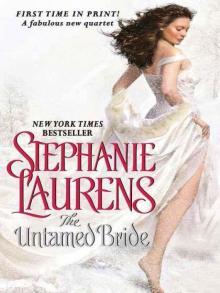 Cobra 01 The Untamed Bride
Cobra 01 The Untamed Bride A Lady of Expectations and Other Stories
A Lady of Expectations and Other Stories By Winter's Light_A Cynster Novel
By Winter's Light_A Cynster Novel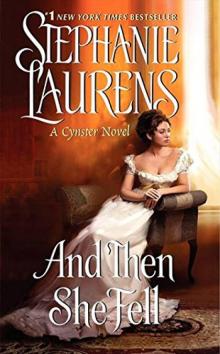 And Then She Fell
And Then She Fell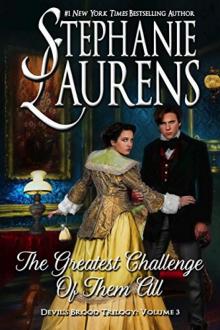 The Greatest Challenge of Them All
The Greatest Challenge of Them All The Edge of Desire
The Edge of Desire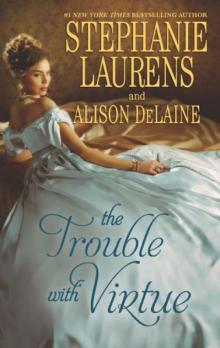 The Trouble With Virtue: A Comfortable WifeA Lady by Day
The Trouble With Virtue: A Comfortable WifeA Lady by Day Fair Juno
Fair Juno THE LEGEND OF NIMWAY HALL: 1750 - JACQUELINE
THE LEGEND OF NIMWAY HALL: 1750 - JACQUELINE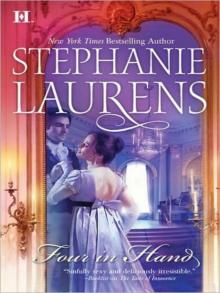 Four In Hand
Four In Hand The Reckless Bride
The Reckless Bride Stephanie Laurens Rogues' Reform Bundle
Stephanie Laurens Rogues' Reform Bundle The Untamed Bride Plus Black Cobra 02-03 and Special Excerpt
The Untamed Bride Plus Black Cobra 02-03 and Special Excerpt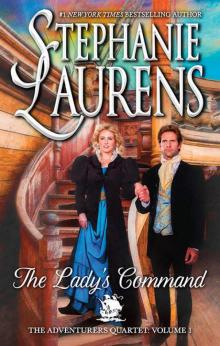 The Lady's Command (Adventurers Quartet #1)
The Lady's Command (Adventurers Quartet #1) The Seduction of Sebastian Trantor
The Seduction of Sebastian Trantor The Daredevil Snared (The Adventurers Quartet Book 3)
The Daredevil Snared (The Adventurers Quartet Book 3)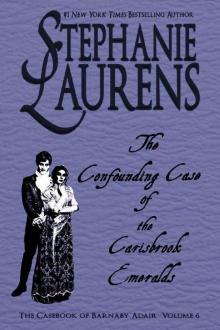 The Confounding Case Of The Carisbrook Emeralds (The Casebook of Barnaby Adair 6)
The Confounding Case Of The Carisbrook Emeralds (The Casebook of Barnaby Adair 6) Lord of the Privateers (The Adventurers Quartet)
Lord of the Privateers (The Adventurers Quartet)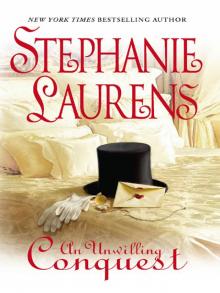 An Unwilling Conquest
An Unwilling Conquest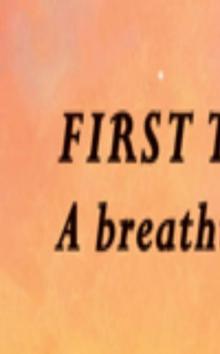 Brazen Bride
Brazen Bride On a Wild Night
On a Wild Night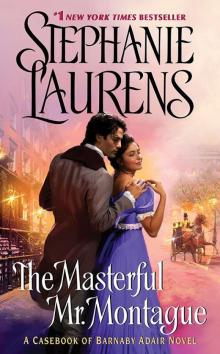 The Masterful Mr. Montague: A Casebook of Barnaby Adair Novel
The Masterful Mr. Montague: A Casebook of Barnaby Adair Novel Lord of the Privateers
Lord of the Privateers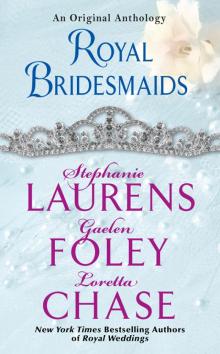 Royal Bridesmaids
Royal Bridesmaids Beyond Seduction
Beyond Seduction It Happened One Night
It Happened One Night The Ideal Bride
The Ideal Bride The Promise in a Kiss
The Promise in a Kiss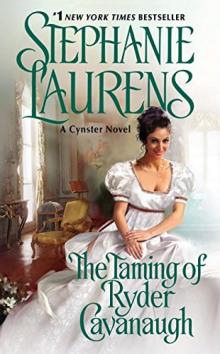 The Taming of Ryder Cavanaugh
The Taming of Ryder Cavanaugh The Ideal Bride c-12
The Ideal Bride c-12 All About Love
All About Love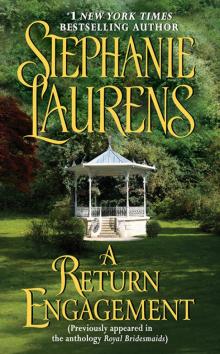 A Return Engagement
A Return Engagement The Untamed Bride Plus Two Full Novels and Bonus Material
The Untamed Bride Plus Two Full Novels and Bonus Material Viscount Breckenridge to the Rescue
Viscount Breckenridge to the Rescue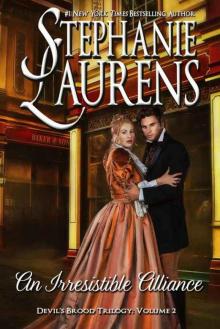 An Irresistible Alliance (Cynsters Next Generation Novels Book 5)
An Irresistible Alliance (Cynsters Next Generation Novels Book 5) The Daredevil Snared
The Daredevil Snared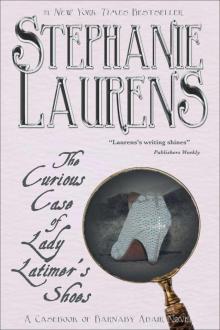 The Curious Case of Lady Latimer's Shoes: A Casebook of Barnaby Adair Novel
The Curious Case of Lady Latimer's Shoes: A Casebook of Barnaby Adair Novel A Lady of Expectations and Other Stories: A Lady of ExpectationsThe Secrets of a CourtesanHow to Woo a Spinster
A Lady of Expectations and Other Stories: A Lady of ExpectationsThe Secrets of a CourtesanHow to Woo a Spinster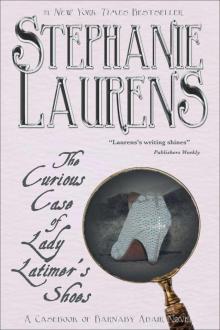 The Curious Case of Lady Latimer's Shoes: A Casebook of Barnaby Adair Novel (The Casebook of Barnaby Adair)
The Curious Case of Lady Latimer's Shoes: A Casebook of Barnaby Adair Novel (The Casebook of Barnaby Adair)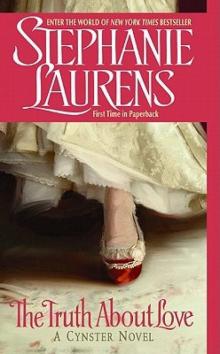 The Truth About Love
The Truth About Love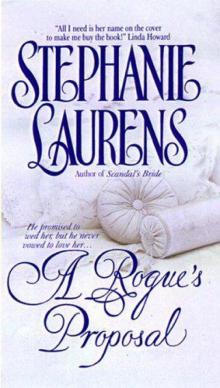 A Rogue's Proposal
A Rogue's Proposal The Elusive Bride
The Elusive Bride The Perfect Lover
The Perfect Lover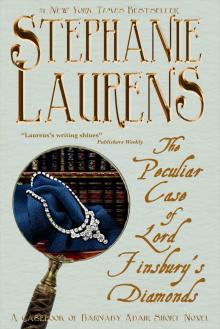 The Peculiar Case of Lord Finsbury's Diamonds: A Casebook of Barnaby Adair Short Novel
The Peculiar Case of Lord Finsbury's Diamonds: A Casebook of Barnaby Adair Short Novel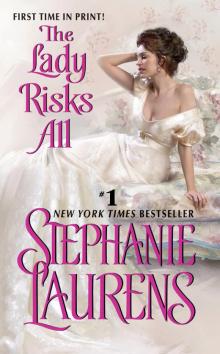 The Lady Risks All
The Lady Risks All The Murder at Mandeville Hall: The Casebook of Barnaby Adair: Volume 7
The Murder at Mandeville Hall: The Casebook of Barnaby Adair: Volume 7 All About Passion
All About Passion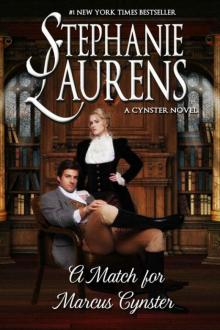 A Match for Marcus Cynster
A Match for Marcus Cynster By Winter's Light: A Cynster Novel (Cynster Special Book 2)
By Winter's Light: A Cynster Novel (Cynster Special Book 2) The Lady By His Side
The Lady By His Side The Pursuits of Lord Kit Cavanaugh
The Pursuits of Lord Kit Cavanaugh Tangled Reins
Tangled Reins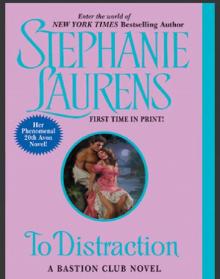 To Distraction
To Distraction A Rake's Vow
A Rake's Vow A Comfortable Wife
A Comfortable Wife A Lady of His Own bc-3
A Lady of His Own bc-3 The Capture of the Earl of Glencrae
The Capture of the Earl of Glencrae Scandals Bride c-3
Scandals Bride c-3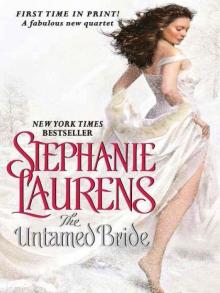 Untamed Bride
Untamed Bride The Brazen Bride
The Brazen Bride The Lady By His Side (Cynsters Next Generation Novels Book 4)
The Lady By His Side (Cynsters Next Generation Novels Book 4) Tangled Reins and Other Stories
Tangled Reins and Other Stories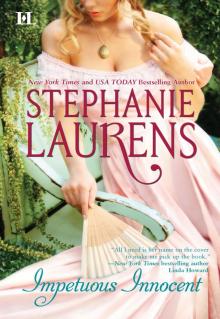 Impetuous Innocent
Impetuous Innocent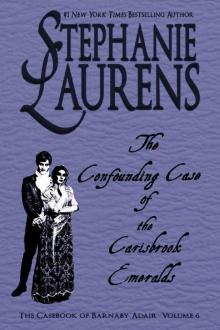 The Confounding Case Of The Carisbrook Emeralds
The Confounding Case Of The Carisbrook Emeralds Stephanie Laurens - B 6 Beyond Seduction
Stephanie Laurens - B 6 Beyond Seduction What Price Love?
What Price Love? A Fine Passion
A Fine Passion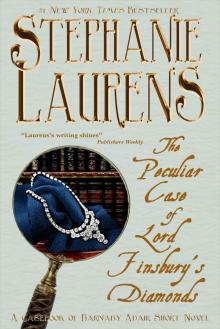 The Peculiar Case of Lord Finsbury's Diamonds: A Casebook of Barnaby Adair Short Novel (The Casebook of Barnaby Adair)
The Peculiar Case of Lord Finsbury's Diamonds: A Casebook of Barnaby Adair Short Novel (The Casebook of Barnaby Adair) Where the Heart Leads
Where the Heart Leads The Designs of Lord Randolph Cavanaugh
The Designs of Lord Randolph Cavanaugh A Secret Love c-5
A Secret Love c-5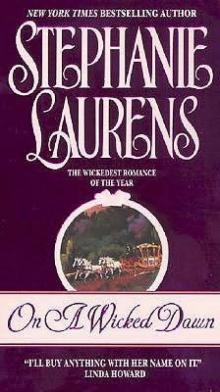 On a Wicked Dawn c-10
On a Wicked Dawn c-10 A Gentleman's Honor
A Gentleman's Honor THE LEGEND OF NIMWAY HALL_1750_JACQUELINE
THE LEGEND OF NIMWAY HALL_1750_JACQUELINE A Lady of Expectations
A Lady of Expectations Royal Weddings: An Original Anthology
Royal Weddings: An Original Anthology The Ideal Bride (Cynster Novels)
The Ideal Bride (Cynster Novels) Mastered by Love
Mastered by Love A Buccaneer at Heart
A Buccaneer at Heart Captain Jack’s Woman / A Gentleman's Honor
Captain Jack’s Woman / A Gentleman's Honor Devil's Bride with Bonus Material
Devil's Bride with Bonus Material A Lady of His Own
A Lady of His Own A Secret Love
A Secret Love Melting Ice
Melting Ice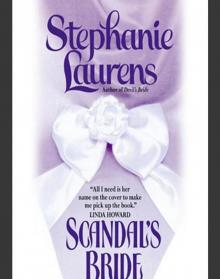 Scandal's Bride
Scandal's Bride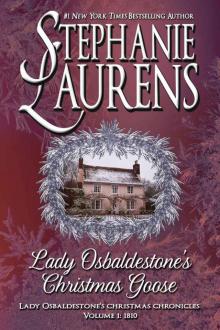 Lady Osbaldestone’s Christmas Goose
Lady Osbaldestone’s Christmas Goose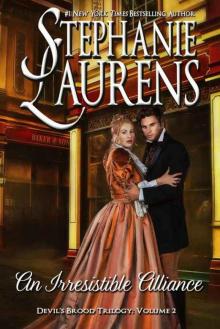 An Irresistible Alliance
An Irresistible Alliance It Happened One Season
It Happened One Season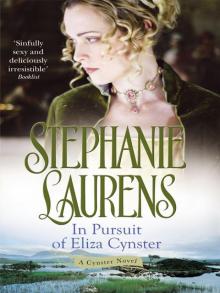 In Pursuit Of Eliza Cynster
In Pursuit Of Eliza Cynster Captain Jack's Woman
Captain Jack's Woman The promise in a kiss c-8
The promise in a kiss c-8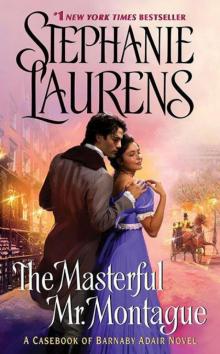 The Masterful Mr. Montague
The Masterful Mr. Montague The Lady Chosen
The Lady Chosen A Gentleman's Honor bc-2
A Gentleman's Honor bc-2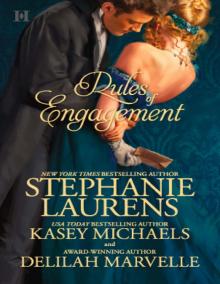 Rules of Engagement: The Reasons for MarriageThe Wedding PartyUnlaced (Lester Family)
Rules of Engagement: The Reasons for MarriageThe Wedding PartyUnlaced (Lester Family) Secrets of a Perfect Night
Secrets of a Perfect Night The Taste of Innocence
The Taste of Innocence On A Wicked Dawn
On A Wicked Dawn The Untamed Bride
The Untamed Bride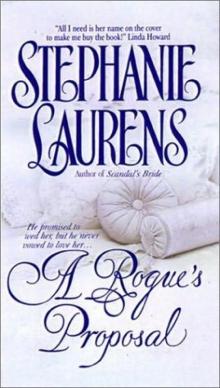 A Rogues Proposal c-4
A Rogues Proposal c-4 Rakes Vow c-2
Rakes Vow c-2 Devils Bride c-1
Devils Bride c-1 Hero, Come Back
Hero, Come Back On a Wild Night c-8
On a Wild Night c-8 All About Passion c-7
All About Passion c-7